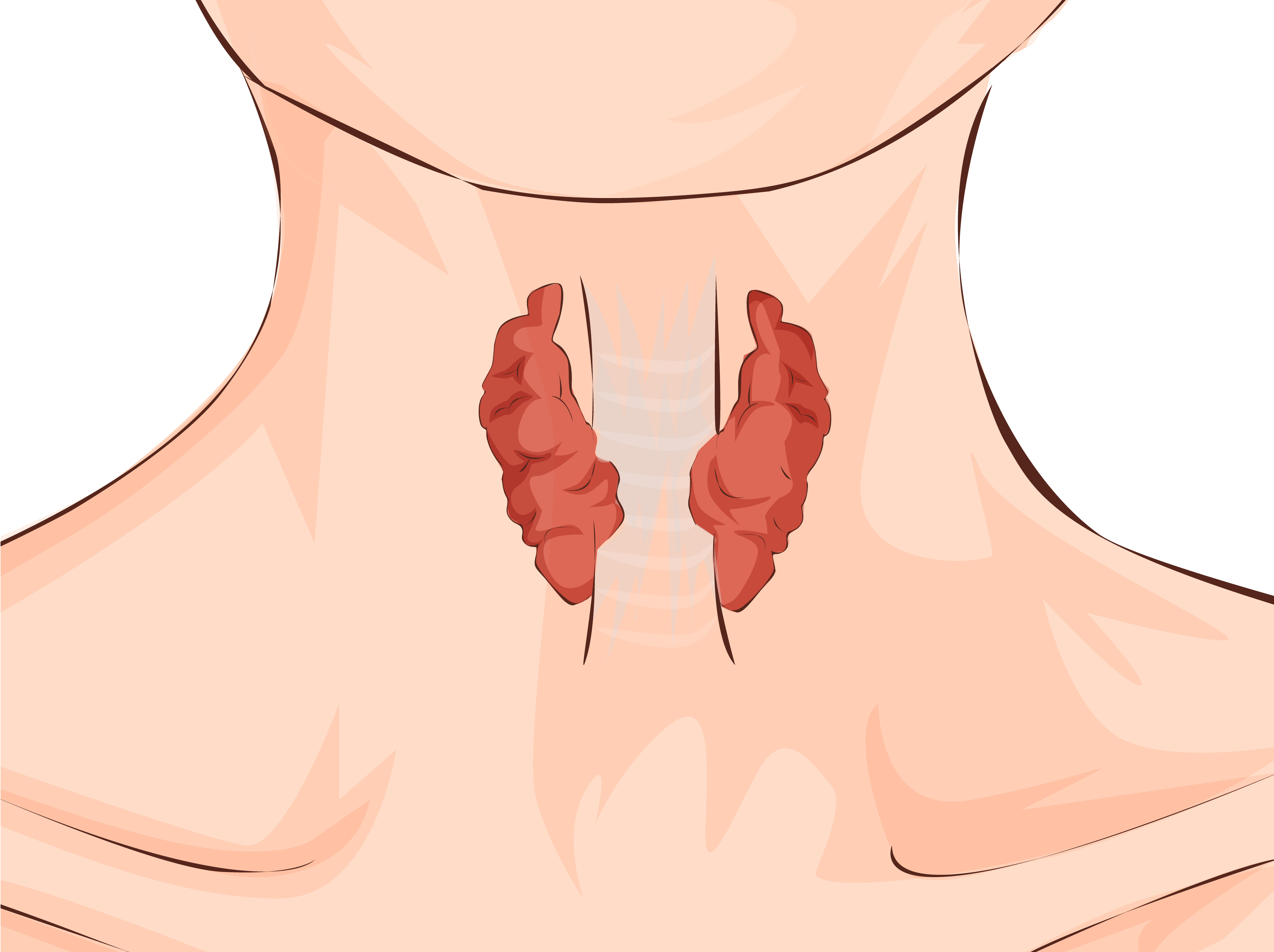The Thyroid is an endocrine gland which produces hormones that regulate the body’s metabolism like heart rate, blood pressure and body temperature. Also, it helps in the conversion of food into energy. The thyroid hormones are important for working of body cells. They help kids grow and develop and regulate growth in adults. However, problems in the basic functions can result in some issues. Let us know everything we need to know about thyroid and its functionality in a person’s well being
Is hypothyroidism a hereditary disease?
Hypothyroidism can also be a hereditary. A condition known as autoimmune thyroiditis (Hashimoto’s disease) is the most common cause of hypothyroidism in which, the body’s immune system reduces the amount of hormones produced by the thyroid gland. The disease of Hashimoto may be inherited, meaning it does have a family history. So not necessarily, but hypothyroidism could be a hereditary disease.
Which is worse, untreated hyperthyroidism or hypothyroidism?
Untreated hyperthyroidism and untreated hypothyroidism, are both not good for health. These are thyroid disorders which negatively impact general health. In hyperthyroidism, the body produces an excess of hormones which can lead to irregular heartbeats, erratic weight-loss and accelerated metabolism. Whereas in the case of hypothyroidism, the body does not produce enough hormones, impacting the metabolic rate and leading to a feeling of tiredness all the time.
What happens if hypothyroidism is left untreated?
If left untreated, Hypothyroidism can lead to complications in the functioning of heart, nerve-related disorders and a slow-down of other basic body functions. This slow down occurs as the thyroid does not produce enough hormones to regulate the body’s metabolism. So leaving hypothyroidism untreated is a risky option. Never leave it untreated.
Were you able to cure your thyroid with yoga?
OR
Can yoga cure thyroid disorders?
Yoga is an age old science of the body. Yoga asanas are considered an important natural remedy for most treatments including thyroid disorders. Although yoga may not be able to cure the condition overnight, it will help stimulate the glands keep the body healthy and control metabolism, thereby avoiding further complications. So yoga asanas are definitely considered good and effective for thyroid disorders which include obesity and insulin resistance.
How to cure my hypothyroidism?
Normal hypothyroidism treatment involves the routine use of synthetic thyroid hormone-levothyroxine (Levo-T, Synthroid and others). The oral drug restores sufficient levels of hormones, correcting hypothyroidism signs and symptoms. The patient usually starts feeling better immediately once the treatment starts. Proper thyroid medication, prescribed by an endocrinologist is one of the best ways to keep hypothyroidism under control.
What are the early symptoms of low thyroid/hypothyroidism?
Early symptoms of hypothyroidism depend on the severity of hormone deficiency. Few early signs are fatigue, constipation, muscle weakness, increased cholesterol levels, thinning hair, slower heart rate, weight gain, muscle aches, irregular menstrual cycle, puffy face, increased sensitivity to cold, dry skin or stiffness in joints. Problems tend to develop gradually, often over several years. It is a good option to take a medical opinion right at the onset of even one symptom.
What are the early symptoms of high thyroid/hyperthyroidism?
Early symptoms of hyperthyroidism are feelings of nervousness, anxiety, unpredictable mood swings and constantly feeling tired throughout the day. In addition, heat sensitivity, unwanted weight loss, fast or irregular heartbeats, sleep problems, skin problems, changes in menstrual cycles and frequent bowel movements.
Is it more difficult to build muscle with hypothyroidism?
Of course, it is difficult to build up muscle when suffering from Hypothyroidism without the right medication and treatment. In fact, a hypothyroid patient faces problems in converting energy from the food consumed. This directly impacts bodybuilding, because of a low metabolic rate, it becomes difficult to burn fat and build muscle. For muscle build up, eating more protein, avoiding gluten and taking medication will show positive results.
Can hypo or hyperthyroid disorder cause dizziness?
Yes, hypo or hyperthyroid can cause dizziness. In both cases the body goes through palpitations, shortness of breath or low blood pressure giving rise to a feeling of weakness or dizziness.
Is thyroid completely curable?Is there any permanent treatment for thyroid?
It is possible to treat thyroid disorders with medication and treatment can result in normal thyroid functioning. But whether it is completely curable or not entirely depends on the extent of the disorder. Treatment can solve many thyroid problems; however, there maybe some which cannot be treated. For all types of hyperthyroidism and hypothyroidism, there are effective treatments readily available. Most of the time, the extent of the disorder can be reduced with proper medication to provide a normal life.
Does levothyroxine increase blood pressure?
Not at all. It is always advisable to use levothyroxine exactly as prescribed by the endocrinologist. Follow the instructions on the prescription, read all drug manuals or instruction sheets. Use the medication as instructed. The doctor can change dosage from time to time depending on the levels. Never quit taking the medicine without consulting or informing the doctor especially in case of pregnancy. During childbirth, having low levels of thyroid hormone can affect both mother and baby. The prescribed dosage may vary during pregnancy.
What is the relation of high blood pressure to hypothyroidism?
Hypothyroidism causes high blood pressure in 3 percent of hypertension patients. Low thyroid function is often associated with hypercholesterolemia and a surge in fatty acids, increasing the risk of cardiovascular disease. As a matter of fact, thyroid hormone supplementation does not necessarily lower blood pressure. So there is very minor relation of high blood pressure to hypothyroidism.
What are the symptoms of thyroid dysfunction?
Symptoms for thyroid dysfunction are fatigue, increased sensitivity to heat or cold, constipation or diahorrea, dry skin, unaccounted weight gain/loss, puffy face, hoarseness, muscle weakness.There are two types of thyroid dysfunctions-hyper and hypothyroidism. It is a good option to go for a hormone check up and tests at the first sign of any of these symptoms.
Can thyroid problems cause BP to rise?
Too much secretion of the thyroid hormone is known as Hyperthyroidism, When too much of this hormone is produced, metabolism increases and overworks the heart. This increased heart rate is known as blood pressure. The endocrinologist will advise tests and prescribe treatment to normalise hyperthyroidism.
How to treat low blood pressure caused by thyroid?
Hypothyroidism can cause heart problems leading to low blood pressure. It is best to get assessed by an endocrinologist and get the right treatment for regularising hypothyroidism and consequently low blood pressure.
What is the treatment of thyroid?
Thyroid is an endocrine gland and the main function is to regulate metabolism or body functioning. Any dysfunction can cause hypo or under secretion or hyper or oversecretion of the thyroid hormone. An endocrinologist is the most qualified to assess the condition and provide the right treatment. Apollo Sugar Clinics have a panel of diabetologists and endocrinologists to deal with every issue.
What are the main dangers of hypothyroidism?
Untreated hypothyroidism can cause many minor issues like fatigue, constipation, sensitivity to cols, low blood pressure,which can sometimes gradually become severe and lead to a life-threatening conditions. Rarely a condition called myxedema, a type of coma that occurs when the body’s level of thyroid hormones becomes extremely low.
Apollo Sugar Clinics have a panel of expert endocrinologists, diabetologists to address every issue which can be caused by endocrine dysfunction like PCOS, Diabetes, thyroid and more.












